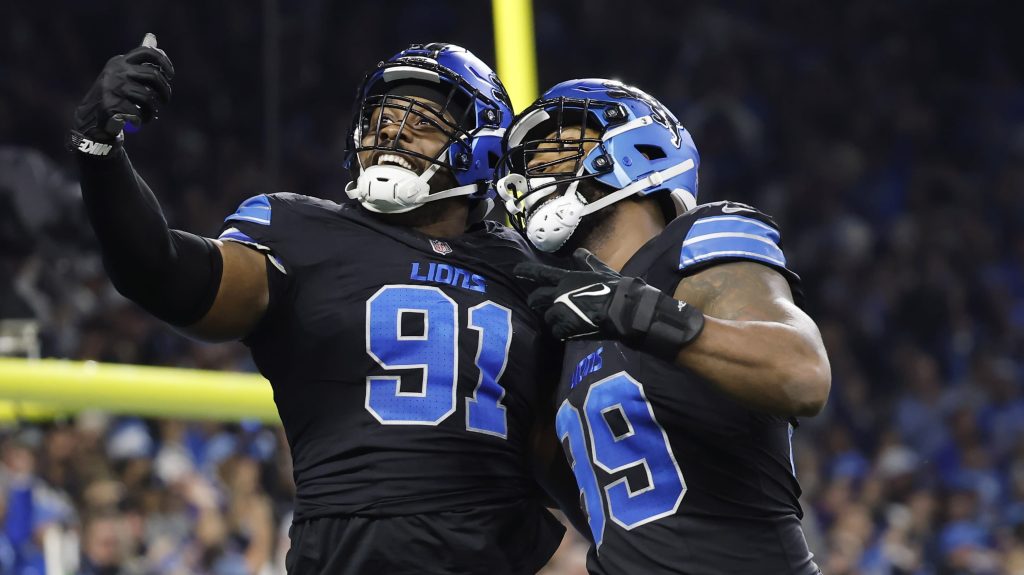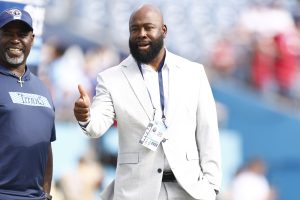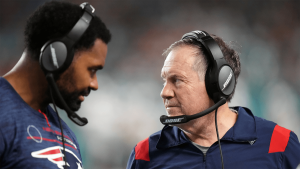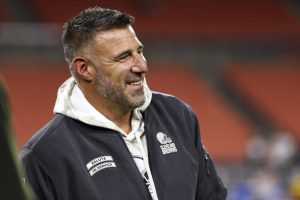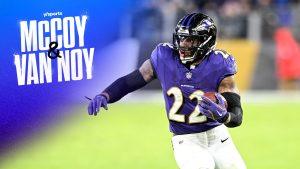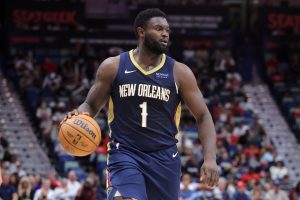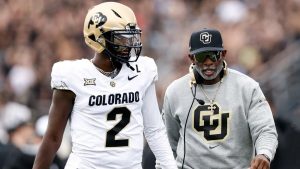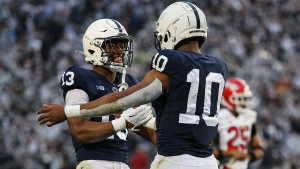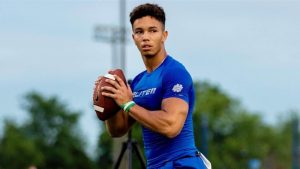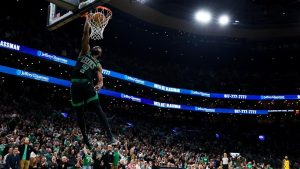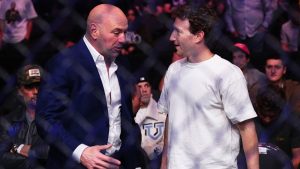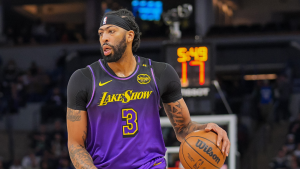Winning 15 games and earning the NFC’s top seed is more evidence of Detroit’s identity-changing rise to one of the NFL’s best franchises. Is a Super Bowl next?
To go where you’ve never gone before — and do something you’ve never done before — you’ve first got to believe it’s actually possible. And that’s probably the hardest part of the journey: fixing your gaze on the unlikeliest of destinations, drawing a road map, and then getting people to actually go along with you, believing they’re going the right way.
That’s what I thought of Sunday night watching Dan Campbell and the Detroit Lions. A head coach and franchise that lost the NFC title game 344 days ago — victims of their own aggression and mistakes — and somehow, some way, came back and drew an even better map back to a Super Bowl doorstep. They beat a streaking 14-2 Minnesota Vikings team that looked ready to give Detroit everything it could handle, only to get disassembled 31-9 in shocking fashion. In the process, the Lions secured the No. 1 playoff seed in the NFC for the first time in team history, earning a bye week of much-needed rest, and forcing the conference’s road to the New Orleans Super Bowl through Detroit.
None of it guarantees the Lions will actually make it to the NFC title game again, let alone break through to a Super Bowl. But it does cement something: That what we saw in Detroit last season — an unyielding resilience and belief matched by talent and coaching — was unquestionably authentic. Not just because the Lions managed to raise a flag in the postseason again, but because it was planted on the most coveted and hotly contested real estate available. A No. 1 seed that went down to the last game of the season, between two teams that had improbably both won 14 games. Forcing an NFL team — for the first time in league history — to have to win 15 games to secure the top seed in a playoff field.
The Detroit Lions did this. Dan Campbell did this. General manager Brad Holmes did this. Defensive coordinator Aaron Glenn and offensive coordinator Ben Johnson, Jared Goff and Jahmyr Gibbs, Brian Branch and a furiously paddling rotation of defensive players — they all did this.
These new “same old Lions,” established in 2021 — who went from three regular season wins to nine. Then 12 to 15. From the rear end of anything just three Januaries ago, to maybe the front end of everything one month from now.
It hurt getting here, of course. Even with the league’s highest scoring offense, it was hardly an easy 15 wins. It took some comebacks and some breaks and often came at a steep cost on the injury report. But as Campbell’s teams have done for two straight seasons, there was a stiffened response to adversity. In the parlance of Campbell’s introductory speech, Detroit got knocked down and lost defensive end Aidan Hutchinson, then bit a kneecap on the way back up. It absorbed Goff throwing five interceptions in a game, but rose up to take another kneecap. It lost David Montgomery, Marcus Davenport, Alim McNeill, Alex Anzalone and many, many others — only to respond by getting up and taking another hunk out of whoever came next.
This is how the old “same old Lions” — repetitive losers, underachievers and disappointments — became the new “same old Lions” … taking it on the chin and then really getting pissed off. After getting thumped by the Buffalo Bills 48-42 in Week 15, then closing out the regular season by hammering the Chicago Bears on the road (34-17), settling a score with the San Francisco 49ers on the site of last season’s NFC title game (40-34), and then burying the Vikings with an incomprehensible defensive barrage that almost nobody believed they were capable of.
And on that latter point, I mean nobody. Because the plan from Glenn was the opposite of what the Lions should have been capable of. Despite a decimated secondary and a pass rush that often had to be manufactured to consistently get pressure, Glenn decided to consistently deploy his corners in man-to-man coverage — often while running cover zero blitzes that begged to get torched. But rather than watching one of the best two-wideout tandems in the NFL feast on deep passing routes, the tactically constructed chaos sped up the clock of Vikings cornerback Sam Darnold. In turn, Darnold made mistakes. He threw too early or out of rhythm. The accuracy that made him so good all season long frayed. And with it, his wideouts struggled to escape tight coverage that had the advantage of only needing to remain sticky for a few seconds at a time.
For Glenn, it was masterful, and the kind of game that will raise his profile as he fields head coaching interviews next week, during the Lions’ playoff bye. That’s right along with the other side of the ball and Johnson, whose balanced scheme on Sunday — utilizing his running backs, wideouts and tight end Sam LaPorta to full effect — only served to once again stamp him as the most coveted offensive tactician among the coordinators that coach-needy NFL teams will be pursuing the next few weeks.
Those opportunities will be the fruits of their labor, alongside the rewards in the win/loss column that they helped provide for Campbell and the franchise. And we can slot Holmes right in the center of that equation, too, thanks to a roster that just keeps finding ways to produce. From trade deadline acquisition Za’Darius Smith at defensive end, to underrated role-fillers like defensive tackle Al-Quadin Muhammad and cornerback Amik Robertson — to foolishly maligned draft picks like running back Gibbs, linebacker Jack Campbell and safety Brian Branch.
They’re all in the caravan — coaches, players, front office executives — on the journey, believing in the possibilities of a destination that nobody really thought was achievable. On Sunday, you could have listened to Goff talk about how nothing was done yet and how this was just another item ticked off the list of goals. Or you could have absorbed Campbell talking about his pride in the moment for his assistant coaches and players. But what you really needed to do was go back to 344 days ago, when the Lions were just barely removed from their season-ending loss to the 49ers.
Nearly one year ago, after sleeping on it for a night and absorbing the deep hurt of that NFC title game defeat, Campbell stood in front of the media and framed the moment in a way that would foreshadow how the Lions got where they are today — locking up the No. 1 playoff seed, preparing for a trek back to the conference championship game. In truth, it’s a moment focused through last season’s failure and the declaration that came out of it.
“Unfortunately,” Campbell said after the NFC title game loss, “you’ve got to live that to really understand why you’re in this business. That’s what it’s for — playoffs, NFC championship game, Super Bowl. And now your eyes are open, and our guys’ eyes are open. This should be the ultimate motivation to push forward. And it will be for us. It will be. We’ll learn and move on.”
“… There’s things that we won’t have to start all the way from scratch, but there’s gotta be that hunger, there’s gotta be that work, there’s gotta be that attention to detail, there’s gotta be that urgency. In that regard, you’re starting all over again. And if you don’t — you think you’re just gonna walk out there because you went to the NFC championship game, you’ve got another thing coming. That’s how you become average in a hurry.”
344 days and 15 regular season wins later, the Lions have not become that. If anything, they’ve gotten better — both in coaching and experience and problem-solving. And most definitely, without a doubt, in their resilience and belief in the face of anything and everything. A resolute confidence that somehow, some way, there is still a traversable path to where they’re going. Even if they have to make it as they go.
Now more than ever, these are your same old Lions. Steady as they go.
